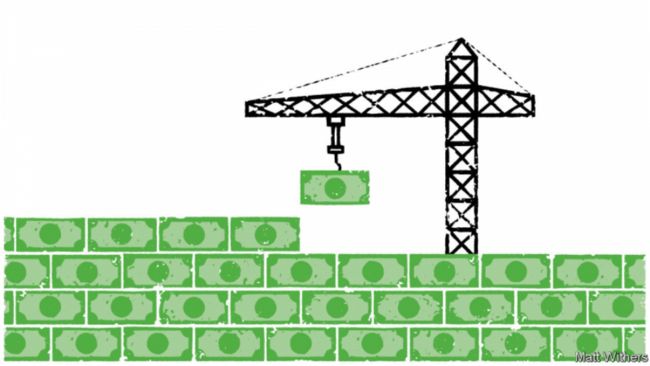经济政策可能看似沉闷,却与国家的繁荣发展息息相关。举三个例子:维修养护、国有资产管理和公共部门会计,这些“乏味”的领域只需要一点点改进就可能获得巨大收益。如同公司管理一样,务实地关注资产负债表可以加强激励,但实际上全球只有一个国家的公共部门会计达标。
赞美基本
In praise of the basics
务实带动
Captain Sensible
captain(v.)lead a group or team 担任队长,率领团队
Large economic gains can result from mundane policy improvements
平淡 的政策改进可以带来巨大的经济效益
Readers of The Economist are easily roused by debates over unconventional monetary policy, the merits of fiscal stimulus and innovative structural reforms. (Don’t deny it.) Other areas of economic policy may lack the same thrilling sense of excitement, but dullness is not the same as irrelevance. There are large gains to be had by doing drab things a little bit better. Take three examples: maintenance, management of state assets and public-sector accounting.
《经济学人》的读者很容易因为有关非常规货币政策、财政刺激和创新结构改革的优点的争论而兴奋起来。(别不承认。)经济政策的其他领域可能不会这么激动人心,但沉闷不等于无关紧要。把乏味的事情做得略微好些就能获得巨大的收益。举三个例子:维修养护、国有资产管理和公共部门会计。
Raising money for repairs is harder than finding the cash for flashy new projects that you can stick your name on. In recent decades America has built many useless new roads, yet the fraction of existing road surfaces that are too bumpy has risen from 10% in 1997 to 21% today. Potholes gradually damage vehicles that drive over them. Faulty locks on the Kiel Canal, which connects the Baltic and North seas, leave ships queuing to get through; sometimes they are forced on a detour around Denmark. Maintenance failures can also lead to fatal catastrophes like the recent bridge collapse in Genoa in Italy.
筹钱来做维护比融资兴建可以给自己贴金的光鲜新项目更难。近几十年来,美国建了大量无用的新路,而现有路面过于颠簸不平整的比例却从1997年的10%上升至今天的21%。坑洼的路面会让行驶其上的车辆逐渐受损。在连接波罗的海和北海的基尔运河(Kiel Canal)上,故障船闸让等待通过的船只排起了长龙,有时它们不得不绕道丹麦。维护不到位还可能导致致命灾难,之前发生在意大利热那亚(Genoa)的桥梁坍塌就是个例子。
Yet if the costs of skimping on repairs can become tragically apparent, it is hard to spot maintenance shortfalls across the economy as a whole. Estimating how quickly assets deteriorate is tricky; so too is the job of tracking repairs, which are often undertaken by companies in-house (see Finance section). Canada has the best figures. It reckons that firms spend 3.3% of GDP on maintenance, more than twice what the country shells out on research and development. That makes repairs important to the economy in the short term, as well as over time.
然而,虽说在维护上省钱可能会付出惨重的代价,但要在整个经济中查找维护缺口并不容易。估算资产损耗的速度很难,追踪通常由企业内部承担的维修工作也一样。在这方面加拿大的数字最亮眼。加拿大估计本国企业在维护上的投入相当于GDP的3.3%,是该国研发投入的两倍多。这使得维修在短期和长期都对经济十分重要。
Penny-pinching governments often let infrastructure crumble regardless. Even stimulus programmes typically favour vanity projects. After the financial crisis America spent twice as much per person on transport projects in sparsely populated areas as it did in cities, where the needs are greatest. Diverting more money into maintenance would be an easy win for society.
吝啬的政府经常任由基础设施朽坏,不顾后果。即使是刺激计划也往往偏向面子工程。金融危机之后,美国在人口稀少地区的交通项目上的人均支出是在交通需求最大的城市的两倍。将更多资金投入维护将可以让社会轻松受益。
If some public assets are poorly maintained, others are inefficiently used. Governments own huge asset portfolios, including swathes of land, firms such as utilities or post offices, and financial assets, such as investments held by public-sector pension funds. The IMF recently studied 31 big countries covering about three-fifths of the global economy and found their collective assets to be worth $101trn, or 219% of their combined GDP. The yields these assets produce vary wildly. SNCF, France’s state-owned railway, earned a return on capital of 7.9% in 2017; Amtrak, America’s closest equivalent, holds assets worth $15bn but makes a loss. The fund reckons that a country moving from the 25th to the 75th percentile for risk-adjusted returns on only some kinds of assets would add annual revenues worth 3% of GDP to its coffers. That is roughly what rich countries earn, on average, from collecting corporate taxes.
如果说一些公共资产维护不善,其他公共资产存在的问题则是未能高效利用。政府拥有庞大的资产组合,包括大片土地、公用事业公司或邮局等企业,以及公共养老基金持有的投资等金融资产。国际货币基金组织(IMF)最近研究了占全球经济规模约五分之三的31个大国,发现它们所持资产的总额为101万亿美元,占其GDP总量的219%。各国资产的收益率差别很大。国有的法国国家铁路公司(SNCF)2017年的资本回报率为7.9%;在美国,对等的美国国家铁路客运公司(Amtrak)持有价值150亿美元的资产,却是亏损的。IMF认为,一个国家若能将其仅仅是部分资产的风险调整后收益从第25百分位上升到第75百分位,就能为国库贡献相当于GDP的3%的年收入。这大致等于富裕国家从公司税中获得的平均收入。
How best to encourage more maintenance or to raise asset yields? Our third boring suggestion, improving public-sector accounting, is part of the answer. At the moment governments focus too much on cashflow and annual borrowing. Crumbling infrastructure and forgone yields do not feature in these figures. So when the state tightens its belt, it often preserves day-to-day spending by cutting maintenance and investment, even when doing so harms the public sector’s net worth once all the beans are properly counted.
如何能最有效地鼓励加大维护投入或提高资产收益率?我们第三个沉闷的建议是改善公共部门会计,这能在一定程度上解决这些问题。目前政府过分关注现金流和每年债务额度,相关数据都没有体现陈旧的基础设施和被弃之不理的资产回报。因此,当国家勒紧腰带时,通常会通过减少维护投入和投资来保证日常开支,即使在最后算总账时发现这样做会损害公共部门的净值。
A businesslike focus on the balance-sheet would improve incentives. Finance ministers might invest more, were the resulting boost to public wealth made clear. And if all state bodies had to account for the capital tied up in their operations, they might feel obliged to put it to better use, or to sell it off. Only in one country, New Zealand, is public-sector accounting up to scratch. It updates its public-sector balance-sheet every month, allowing for a timely assessment of public-sector net worth. Britain produces good numbers, too, but with a delay of over a year—too long a lag for the figures to shape policy.
务实地关注资产负债表将可以改善激励机制。如果增加投资对公共财富的提升作用清楚体现在账目上,那么财政部长可能就会做更多投入。如果所有国家机构都必须对与其运营相关的资本做出清晰的记录和解释,那么它们可能就会觉得有必要更好地利用该项资本,或将其卖掉。只有一个国家的公共部门会计是达标的,那就是新西兰。该国每月更新公共部门的资产负债表,以便及时评估公共部门的净资产。英国的公共部门会计做得也不错,但是要等一年多才出结果——要用来制定政策,这样的滞后太久了。
All this may sound more like a cure for insomnia than for economies’ ills. Yet getting basic issues right would produce greater gains than many of the brilliant ideas that politicians trumpet in order to dazzle voters. Being boring might not capture attention. But it could actually do some good.
所有这些听起来更像是治疗失眠的妙方,而不是解决各个经济体弊病的良药。然而,正确处理基础问题能产生巨大的收益,远非政客为震撼选民而鼓吹的许多高招所能及。沉闷可能不会引人注意,但有可能带来切实的好处。■
